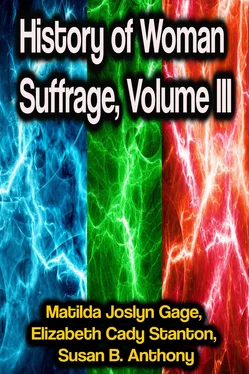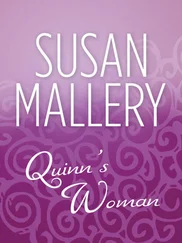Mrs. Gougar, on our Washington platform for the first time, delighted the audience with her readiness and wit. She has a good voice, fine presence, and speaks fluently, without notes.
She spoke of the reformatory prison for women in her State, and said that the statistics showed that eighty-two per cent. of the women confined there were sent out reformed. Speaking of the gallantry of men, she cited a case of a man who came to an Indiana lawyer and desired him to make a will. The following conversation ensued: "I want you to make this will so that my wife will have $400 a year; that's enough for any woman." "Is she the only wife you ever had?" "Yes." "How long have you been married?" "Forty-two years." "How many children have you had?" "Eleven." "Did you have all your property before marriage?" "No; didn't have a cent; I've earned it all." "Has your wife helped you in any way to earn it?" "Why, yes, I suppose she has; but then I want to fix my will so she can only have $400 a year; it's enough." "Well, sir, you will have to move out of the State of Indiana then, for the law provides for the wife better than that, and you will have to get another lawyer." It is needless to say that this lawyer is a staunch champion of woman suffrage, and it is pleasant to know that there are more such men being educated by this agitation.
Mrs. Maxwell gave a fine recitation of "The Dying Soldier," at one of the evening sessions. It was evident by the sparkling eyes of the Indiana delegation that the ladies had in reserve some pleasant surprise for the convention, which at last revealed itself in the person of Judge Orth, a live member of congress from Indiana, who stood up like a man and avowed his belief in woman suffrage. His words were few but to the point, and his hearers all knew exactly where he stood on the question.
The next evening the Nebraska delegation, determining not to be outdone, captured one of their United States senators and triumphantly brought him on the platform. It was a point gained to have a congressman publicly give in his adhesion to the question, but how much greater the achievement to appear in the convention with a United States senator. It was a proud moment for Mrs. Colby when Senator Saunders, a large man of fine proportions, stepped to the front. But alas! her triumph over the Indiana ladies was short indeed, for while the senator surpassed the representative in size and official honors, he fell far below him in the logic of his statements and the earnestness of his principles. In fact the audience and the platform were in doubt at the close of his remarks as to his true position on the question. Mrs. May Wright Sewall, who followed him, sparkled with the satisfaction she expressed in paying most glowing tributes to the men of Indiana and their State institutions. She said:
The principal objection to woman suffrage has always been that it will take women from their homes and destroy all home life. She showed that there is not an interest of home which is not represented in the State, and that the subordination of the State to the family has kept pace with the subordination of physical to spiritual force. Woman has an interest in everything which affects the State, and only lacks the legitimate instrument of these interests—the ballot—with which to enforce them. Life regulates legislation. Domestic life is woman's sphere, but a sphere of much larger dimensions than has ever yet been accorded it, these dimensions reaching out and controlling the functions of the State. The ballot is not a political or a military, but a domestic necessity.
Mrs. Harriette R. Shattuck spoke on the golden rule, asking men to put themselves in the place of disfranchised women, and then legislate for them as they would be legislated for. Mrs. Robinson gave a résumé of the legal, political and educational position of women in Massachusetts. Mrs. Hooker showed that political equality would dignify woman in home life, give added weight to her opinions on all questions, and command new respect for her from all classes of men. Mrs. Colby gave an interesting address on "The Social Evolution of Woman":
She traced the history of woman from the time when she was bought and sold, up to the present. She said that the first believer in woman's rights was the one who first proposed that women should be allowed to eat with their husbands. This once granted, everything else has followed of necessity, and the ballot will be the crowning right. Once women were not allowed to sing soprano because it was the "governing part." From these and many like indignities woman has gradually evolved until she now stands on an equality with man in many social rights.
Martha McClellan Brown read an able essay on "The Power of the Veto." She is a woman of fine presence, pleasing manners and a well trained voice that can fill any hall. Her address was one of the best in the convention and all felt that in her we had a valuable acquisition to our Association. Mrs. Gage gave an able address on "The Moral Force of Woman Suffrage."
During the first day of the convention a request, signed by the officers of the association, was sent to the Special Committee on Woman Suffrage in the Senate, asking for a hearing on the sixteenth amendment to the constitution. The hearing was granted on Friday morning, January 20, 1882. A distinguished speaker in England having advised the friends of suffrage there to employ young and attractive women to advocate the measure, as the speediest means of success, Miss Anthony took the hint in making the selection for the first hearing before the committee of those who had never been heard before,[85] of whom some were young, and all attractive as speakers. Miss Anthony said that she would introduce some new speakers to the committee, in order to disprove the allegation that "it was always the same old set." The committee listened to them with undivided attention throughout, and at the conclusion of the hearing the following resolution, offered by Senator George of Mississippi, was adopted unanimously:
Resolved , That the committee are under obligations to the representatives of the women of the United States for their attendance this morning, and for the able and instructive addresses which have been made, and that the committee assure them that they will give to the subject of woman suffrage the careful and impartial consideration which its grave importance demands.
In describing the occasion for the Boston Transcript , Mrs. Shattuck said:
As we stood in the committee-room and presented our plea for freedom, we felt that at last we had obtained a fair hearing, whatever its result might be. And the most encouraging sign of the impression made by our words was the change in the faces of some of the members of the committee as the speaking went on. At first there was a look of indifference and scorn—merely toleration; this gradually changed to interest mingled with surprise; finally, as Miss Anthony closed with one of her most eloquent appeals, all the faces showed a decided and almost eager interest in what we had to say. Senator George, who certainly looked more unpropitious than any other one, assured the ladies that he would give to the subject of woman suffrage that careful and impartial consideration which its grave importance demands. This, from one who heralded his entrance by inquiring of Miss Anthony, in stentorian tones, if she "wanted to go to war," was, to say the least, a concession. The speakers were closely questioned by some members of the committee, who afterwards told us "that they had never heard a speech on the subject before and were surprised to find so much in the demand, and to see such ability as was manifested by the women before them."
The committee having expressed a wish to hear others on the subject, appointed the next morning at 10 o'clock.[86] Mrs. Stanton, being introduced by the chairman, said:
Читать дальше












